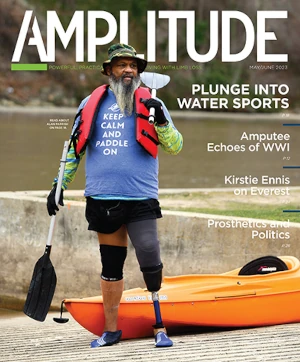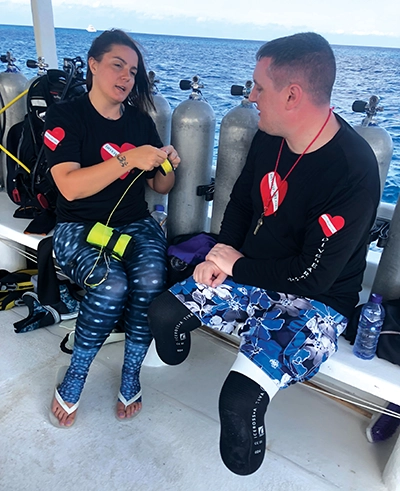
Diveheart
Excerpt from “AMPUTEES ARE TAKING THE PLUNGE INTO WATER SPORTS”, Amplitude Magazine May/June 2023
Scuba Diving

Photo courtesy Diveheart.
Chris McClanathan took his first scuba lesson in a heated pool during a week-long VA camp for wounded veterans. His buoyancy as a bilateral amputee was different than before his amputation, so he had to relearn how to swim and float.
McClanathan kept working at it and eventually earned certification from Diveheart, an adaptive-sports nonprofit that operates in Illinois, Georgia, and elsewhere. His certification enables him to scuba dive in any setting, even with outfitters that don’t have specific expertise with adaptive divers. McClanathan can self-advocate because he knows what his abilities are and how to take care of himself during a dive. He uses an AMP Fin, a mechanical accessory that attaches to his prosthetic socket for swimming and diving, and Darkfin gloves with webbing on the back that allows him to manipulate his equipment while in the water.
A well-kept secret about scuba diving is that it’s one of the more accessible water sports. Most beginner lessons are held in swimming pools, so you can try it out at a local rec center instead of traveling to an oceanside location. Masks, tanks, and other equipment are all usually provided by the dive school, and you don’t have to be in great shape to sign up.
“Many skills are transferrable,” McClanathan says, “so if you learn techniques for an activity on land, you can carry it forward in the water.” So why don’t more amputees try scuba diving? “The biggest barriers are often in one’s own head,” he says. “I wasn’t into sports much growing up, but I’ve tried a lot of them for the first time after amputation. It’s never too late to start.”
Once you try scuba, your only regret may be that you didn’t get started sooner.
